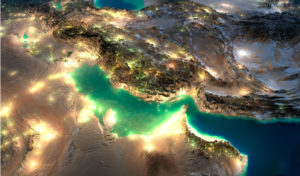
By Anton Balazh @ Shutterstock.com
Andrew Bracevich writes in The American Conservative that the U.S.’s backing of Saudi Arabia is positively bizarre. Saudi is one of the world’s worst regimes. Bracevich suggests that the entire plan for U.S. engagement in the Persian Gulf needs to change if America is looking for a win. He writes (abridged):
The House of Saud is a regime, a dynastic enterprise masquerading as a nation-state. Iran, by contrast, is the modern incarnation of an ancient civilization. The antagonism between the two is deep-seated, genuine, and destined to persist.
How the United States found itself aligned with the former against the latter is a story fraught with miscalculation, folly, and hubris. Taken as a whole, it’s our version of Lawrence of Arabia.
Saudi Arabia qualifies as an American friend and ally in precisely the same sense as does the state of Israel. In both countries, cold calculation rather than warm regard governs attitudes toward the United States. Each faces a list of national security challenges longer than it can comfortably handle on its own. Over several decades, in hopes of mitigating those challenges, each has worked assiduously to cultivate a close relationship with Washington.
Saudi Arabia is not part of the West, by even the most expansive definition of that term. While the Israeli commitment to individual freedom, human rights, and liberal democratic principles is imperfect and selective, the Saudi commitment to those values is nonexistent. Indeed, for decades the Saudi government has demonstrated an acute aversion to the values that the United States and others in the West profess to represent. In global rankings of illiberal and undemocratic regimes, Saudi Arabia ranks right near the top.
Therefore it seems passing strange—no, make that positively bizarre—that the United States, during the “America First” presidency of Donald Trump, should side with Saudi Arabia against Iran in what is a Muslim version of the “Great Game,” pitting Arab against Persian and Sunni against Shia. In the eyes of the two main adversaries, the stakes in this Great Game are monumental. Control of the Persian Gulf could be up for grabs, perhaps even the very future of Islam itself.
The arguments for the United States picking sides in this dispute are weak. If anything, doing so is likely to compound the long string of misjudgments characterizing U.S. policy in this part of the world since the end of the Cold War.
The purpose of U.S. policy in the region should be to reduce the incidence of violence and unrest, restore order, and thereby repair the damage to which the United States itself has so mightily contributed in recent years. As for the geopolitical competition between Saudi Arabia and Iran, as an American secretary of state once remarked in a different context, we don’t have a dog in that fight. Much the same can be said regarding the ancient dispute between Sunni and Shia Muslims, which predates the Protestant Reformation by several centuries.
The diplomatic challenge facing the United States is to cajole Iran into moderating its behavior.
Read more here.
Andrew J. Bacevich, “America’s War for the Greater Middle East”
If you’re willing to fight for Main Street America, click here to sign up for my free weekly email.








